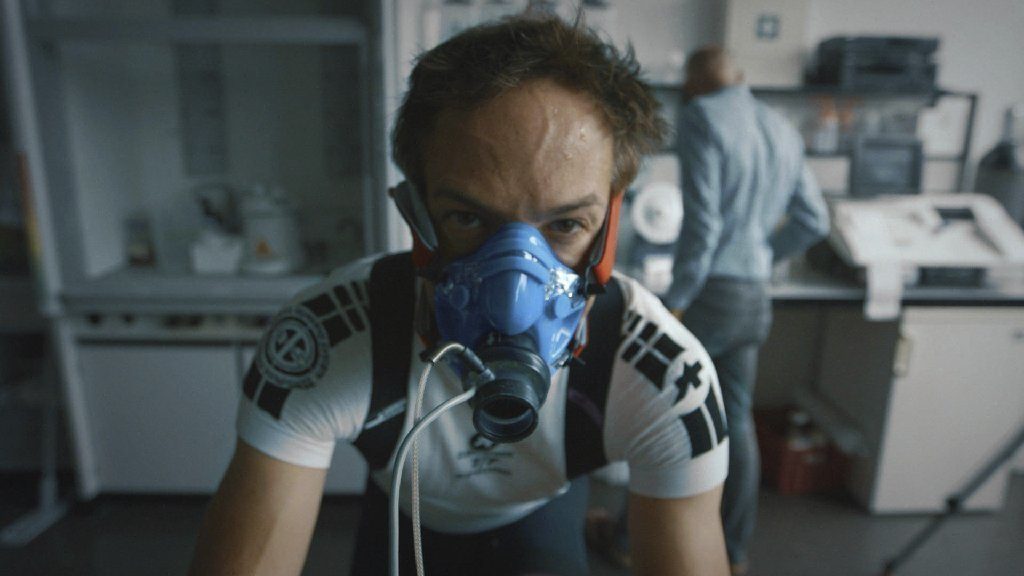“Even to understand the word ‘doublethink’ involves the use of doublethink. I was doing in parallel two things which cancelled out each other and being fully contradictory.”
2017. 121 minutes. Rated TV-MA.

A friend of mine described Icarus as the Super Size Me of athletic doping and that’s not so off-base. The film’s director and star, Bryan Fogel, puts himself through a battery of unpleasant injections and elaborate urine tests to be able to see if it’s possible to bypass the drug tests used to prove cheating at the professional level. He enlists the help of Grigory Rodchenkov, the former director of Moscow’s Anti-Doping Centre (a laboratory that did exactly the opposite of what its name implies).
Rodchenkov is a surprisingly kindly and frequently hilarious character who blows a whistle not only on his home country’s actions, but on the selectively blind eye of the World Anti-Doping Agency (WADA) as well. Though Fogel’s experiments with doping don’t amount to a better performance in the Haute Route, the toughest amateur cycling race in the world (which doesn’t even test its participants, as he later learns), he does strike a dear friendship with Rodchenkov and arguably saves the disgraced man’s life, helping him sneak away to Los Angeles and later enter the Witness Protection Program before Russian officials have a chance to plan any untimely ends.
Even if you don’t care about professional cycling or sports in general, Olympic or otherwise, Rodchenkov’s insider view is amazing to see unravelled, as is the complex web of politics and propaganda that’s been spun around Russian athletics. Rodchenkov takes indirect responsibility for Vladimir Putin‘s aggressiveness and the war with Ukraine in the wake of Russia’s doping-aided success at the 2014 Winter Olympics in Sochi. The structure of the film does an excellent job with paralleling the concentric circles that make up conspiracy and lies, starting with Fogel’s individual cheats and zooming out to the worldwide impact of the inefficacy of organizations like WADA. It’s all an impressive bit of dumb luck on Fogel’s part, too–the first doctor he reaches out to for doping tutelage refers him to Rodchenkov, and the story writes itself from there.
I read a few other reviews of Icarus including this one from The Atlantic in which Sophie Gilbert wrote, “[T]he movie’s most obvious flaw is that it fails to fully parse [Rodchenkov’s] motivations.” I’m not sure I agree that’s the case, considering the man’s downcast demeanor during his revelations and the level of risk he’s willing to take by speaking to authorities from WADA, the Olympics, and the U.S. Department of Justice. Rodchenkov is such a compelling character in part because his position is pretty easy to recognize and relate to. He’s not a bad guy; he’s a cog turning within a bad system, and it’s very tough to describe someone with his silly personality, dundering charm, and love of dogs as “evil.”
Fogel makes for an interesting character, too, clearly disappointed by his lacking performance in the race he doped for. He marvels at how even when he’s gaming the system with a world-class cheater, there will always be guys who will always ride better than he can. This realization shakes him, as it would anybody with an athlete’s desire to be, or at least be able to compete with, the best. Rodchenkov sees how this loss pains his friend and he short-circuits Fogel’s self-critical obsessing by enlisting him as right-hand man in his crusade. Could this be the motivation Gilbert says was missing from the movie? Maybe it’s not the one and only reason, but good friends know that partnering on big projects is a great cure for bad feelings. Fogel may never wear the maillot jaune, but as he wondered why, he made an incredible film along the route.
